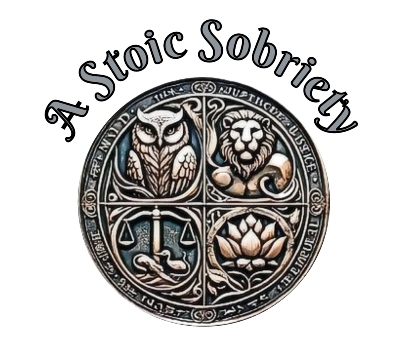Resilience in Sobriety: Stoic Practices for Addiction Recovery
Cultivating resilience in sobriety is critical to maintaining a lasting and meaningful recovery. Resilience is a dynamic quality that combines one’s mindset, skill set, and personal characteristics and can be developed over time. The ancient philosophy Stoicism teaches us that cultivating resilience helps build inner strength, find tranquility, and persevere through tough times.
The Stoics demonstrated resilience by living virtuously and maintaining inner peace regardless of external circumstances. Chrysippus, one of the early Stoics, described resilience as a fire that consumes whatever is thrown into it. He taught that adversity, rather than extinguishing a person, should be fuel for growth. Bill W. reinforces this thinking in the book As Bill Sees It, saying, “Adversity is the touchstone of spiritual growth.”
The road to recovery from addiction and our time in recovery is full of challenges. Stopping the use of substances as our coping mechanism is just the beginning of a difficult journey. We must take accountability for the damage we have done to ourselves, our families, our friends, and our employers. While we are doing this, the disease of addiction is nipping at our heels. The development of resilience is critical to maintaining sobriety.
In this article, we will explore the different elements of resilience and cover practical ways to work day-to-day to make it a mainstay in our lives. Bill W. understood the concept well, as he once said, “No personal calamity is so crushing that something true and great can’t be made of it.”
Key Stoic Principles for Building Resilience in Recovery
First, let’s examine three key concepts within Stoicism that are directly involved with the Stoic view of resilience. The concepts are a dichotomy of control, “premeditation Malorum,” and “amor fati.”
The Dichotomy of Control: Finding Peace in Acceptance
Stoic philosophy centers on accepting what we can’t control while focusing on what we can. This concept is also at the heart of The Serenity Prayer. The Stoics divide life into things we can control and cannot. The skill we need to develop is the ability to look at any situation in life and decide which bucket it falls into.
We are faced daily with opportunities to practice this decision-making. We will encounter situations with people, places, and things that may trigger anger, frustration, or other emotions that require our response. We often respond to these situations to control them. Rather than objectively thinking about whether or not we can control it, we stubbornly bang our heads against immovable walls, only injuring ourselves.
By acknowledging that something is out of our control, we can move on and focus our energy on more productive pursuits. I may not seem like it on the surface, but this is a genuinely life-changing practice for those who have an addiction. The Big Book reminds us, “And acceptance is the answer to all my problems today.” By practicing this, we can grant ourselves new freedom with a little effort.
Premeditatio Malorum: Mentally Preparing for Adversity in Recovery
The Stoic practice of “premeditatio Malorum” urges individuals to mentally prepare for adversity. This practice is mainly a mental exercise, but the Stoics also found tangible ways to practice it. By envisioning potential setbacks and reflecting on how we might respond, we can fortify ourselves against challenges. We are talking about a proactive mindset that equips us in recovery with resilience to navigate potential triggers and cravings.
Seneca often wrote about this practice. In his letters, he advised anticipating and mentally rehearsing potential misfortunes. For example, in his “Letters to Lucilius,” Seneca suggests imagining the loss of possessions, the unfaithfulness of friends, or even personal misfortunes. He didn’t intend to be pessimistic in encouraging these imaginations. The goal is to weaken the impact of these events should they occur as we have thought through our reactions.
We are not suppressing our feelings; we are better preparing ourselves to face the situation as we have predicted possible outcomes. A secondary benefit of this practice is the gratitude that we are not facing these challenges right now.
Amor Fati: Loving Life’s Terms in Sobriety
“Amor fati,” or love of fate, encourages embracing all that life offers us, whether it be a cause for celebration or sadness. In AA, this is often called “living life on life’s terms.” Rather than simply tolerating, enduring, or accepting life’s events, amor fati is about embracing them — finding a way to welcome all aspects of life. By loving one’s fate, one is in harmony with the universe and its unfolding.
The practice involves an optimistic acceptance where every event, no matter how challenging, is seen as having some positive aspect or as a necessary part of the universe’s larger, beneficial plan. Unlike passive resignation, it is an active stance. It’s not about giving up in the face of fate but loving and actively engaging with it, finding meaning and value in whatever occurs.
Amor fati is about transforming suffering into something beneficial. It’s the belief that there is something to be learned and gained from every situation and that suffering can be a powerful catalyst for personal growth. This mindset means accepting relapse as part of the healing journey for some in recovery. While it is a setback, it is not a complete failure but a significant opportunity for learning and growth.
Stoic Equanimity: Cultivating Calmness for Lasting Recovery
Stoicism stresses equanimity (mental calmness and composure) in adversity. Developing inner calm rather than letting emotions dictate reactions helps us weather the storms of life with clear thinking and resilience.
The key is not being overly disturbed by external events, whether good or bad. This means not getting excessively excited in good times or overly depressed in bad times. They teach us to see situations as they are without adding a layer of personal bias, emotional reaction, or catastrophizing. The goal is to keep our emotions balanced and rational.
Practicing the three concepts outlined above is at the core of attaining the goal. Instead of being paralyzed when bad things happen, we must focus on taking action and finding ways to build resilience for future challenges. We can view everything in life as an opportunity for growth, character development, and the practice of virtues like patience, courage, and resilience.
Developing resilience is about growing our mental strength so life’s ups and downs do not sway us. Epictetus’s quote, “We cannot control the external events around us, but we can control our reactions to them,” captures the essence of Stoic thought.
Practical Strategies for Building Resilience in Recovery
Shift Focus to What We Control – External events, opinions, and circumstances are not under our power, but our responses are. When something unsettling occurs, we can take a minute to say The Serenity Prayer: “God grant me the serenity to accept the things I cannot change, courage to change the things I can, and wisdom to know the difference.” Once we have said the prayer, we determine whether we have any control over the situation or not and then act accordingly to accept it or take some action.
View Obstacles as Opportunities – As Marcus Aurelius put it, “The impediment to action advances action. What stands in the way becomes the way.” Doing this takes some intentional thought to switch our thinking if we view obstacles negatively. We may need to challenge ourselves with questions like “Is there something positive I can take from this situation?” or “Does becoming paralyzed by this situation help me or others in any way?”
Develop Emotional Courage – In the face of challenges, we want to train ourselves to endure and grow stronger instead of avoiding discomfort. Much of our addiction was driven by avoiding emotional pain. As a default, we may look for something external to soothe our feelings, but a critical part of our recovery is developing inner resources to address our discomfort.
While we have a support system to help us develop this resiliency, it is our responsibility to put in the personal work to change our thinking and habits. Journaling can be a powerful tool for us to chronicle our thoughts and actions through tough times so we can later review our entries for patterns and opportunities for growth.
Practice Voluntary Hardship – This is directly related to the concept of premeditatio malorum described above. As mentioned, premeditatio Malorum is typically a mental exercise. For example, Epictetus wrote in his Discourses, “When you are about to kiss your child, whisper to yourself, ‘Tomorrow you may die.'” However, the Stoics sometimes exposed themselves to temporary discomfort to build resilience.
In Seneca’s Letters, he wrote to Lucilius, “Set aside now and then a number of days during which you shall be content with the scantiest and cheapest fare, with coarse and rough dress, saying to yourself the while: ‘Is this the condition that I feared?'” Additionally, Cato wore simple clothing, walked barefoot, and refused any luxuries, although he had the means to do otherwise.
Conclusion
For many of us, recovery from addiction is the hardest thing we have ever had to do. On the road to recovery, we face setbacks that can shake our resolve. Stoicism is a steadfast guide, helping us cultivate resilience and bounce back stronger. Seneca noted, “To bear trials with a calm mind robs misfortune of its strength and burden.”
Stoicism offers a timeless guide for cultivating resilience when facing life’s challenges, which is especially crucial for us in recovery. Acceptance, cool-mindedness, and self-discipline build our inner strength to overcome setbacks. As we navigate recovery’s ups and downs, Stoic teachings give us the tools to learn and grow, facing our journey with courage and determination.
Seneca’s words resonate: “No man is more unhappy than he who never faces adversity. For he is not permitted to prove himself.”
Resources
The 3 Secrets of Resilient People – TED Talks – Lucy Hone
Resilience: A Mindset for Everyday Life – TED Talk – Joana Baquero

Written By Tony Harte
Blog Articles
A Definition of Addiction: Keeping It Simple
Addiction Explained: From History to Modern Understanding Due to it's complexity, a...
Overcoming Addiction: A Guide to Treatment Methods Part 1
[pac_divi_table_of_contents included_headings="on|on|on|off|off|off"...
Conquer Detox and Reclaim Your Life
Conquer Detox: An Introduction What is the launching point into recovery? Conquer Detox!...
Break Free from Denial: Unlocking the Path to Lasting Recovery
[pac_divi_table_of_contents included_headings="on|on|on|on|off|off" _builder_version="4.27.4"...
Crack the Code: Identify and Defeat Substance Abuse Triggers
[pac_divi_table_of_contents exclude_headings_by_class="on" included_headings="on|on|on|on|off|off"...


